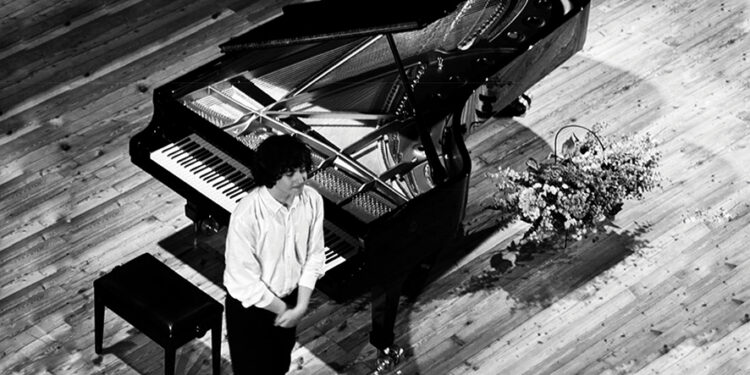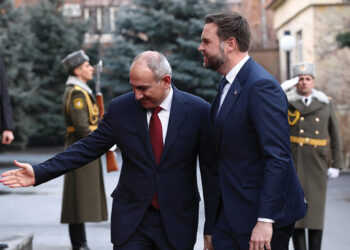It is difficult to write about a piano recital like this without sounding overwhelmed, but perhaps that is the only appropriate reaction. On July 15th, inside the Grand Hall of the Tbilisi State Conservatoire a musical event unfolded that was a seance. The pianist was Tsotne Zedginidze, a 15-year-old Georgian composer-performer whose biography reads like a fable and whose music already carries the psychological weight of tomorrow.
The concert, dedicated to the memory of his mother, Irene Sulkhanishvili, was divided into two stark and internally resonant halves. First, two of Zedginidze’s own compositions: the “Alpine Elegie” and a “Paraphrase on Motifs of Wagner’s Ring of the Nibelungs.” After intermission, came a towering reading of Johannes Brahms’s Piano Sonata No. 3 in F minor, Op. 5—a composition filled with youthful anguish and cosmic aspirations. The pairing wasn’t chronological—it was spiritual. A boy composing his grief meets a 20-year-old Brahms wrestling with the same: death, memory, sublimity.
A Voice Beyond Age: The Context of Tsotne Zedginidze
To call Zedginidze a prodigy feels both accurate and inadequate. Born in 2009, into one of Georgia’s most revered musical lineages, Tsotne began piano studies at age 5, was composing original works at age 6, and made his solo debut by age 10, performing pieces by Berg, Janácek, and his own early music in Tbilisi.
By age 12, he was already appearing with major European orchestras, and by 14, performing with Sir Simon Rattle. The Lisa Batiashvili Foundation has supported his growth as a composer and performer; his Violin Sonata, premiered with Batiashvili herself, marked a turning point in his public recognition.
Alpine Elegy: The Silence of Memory
Opening the program, Alpine Elegie plunged the hall into stillness. There were no familiar reference points. No grand romantic gestures. Instead, a series of floating tonal masses, barely voiced chords, ghosted intervals. Zedginidze composed this piece in the wake of his mother’s passing. But rather than writing a weeping requiem, he has sculpted grief into a topography: cold, elevated, distanced. As if one is walking alone through a white field, barely able to distinguish sky from snow.
Harmonically, the work bears resemblance to the late works of Liszt or the mystical austerity of Ustvolskaya. Emotionally, it avoids the catharsis of Romantic pathos. Here, memory flickers, blurs, repeats, then evaporates. The music is not “about” mourning. It is mourning: non-linear, interior, atmospheric. Zedginidze’s performance was technically flawless, but more impressively, emotionally translucent. He plays like someone who listens more than he speaks.
Wagner Paraphrased: Myths Disfigured by Grief
With Paraphrase on Motifs from Wagner’s Ring, Zedginidze enters the domain of epic sound. But this is not Liszt’s flamboyant paraphrase tradition. The young composer dismantles Wagner from the inside—stripping back bombast to reveal a haunted skeleton. Leitmotifs are quoted, but barely. They pass by like figures in a dream—recognizable, but deformed.
Here is grief transfigured into archetype. The Ring is, after all, a cycle of mothers and sons, betrayals and silences. Zedginidze channels its metaphysical violence—riffs explode, recede, burn out. The work demands enormous physical control—Wagnerian weight in a pianistic body—and Zedginidze met that challenge without bravado. There was no exhibitionism. Only architecture, fire, and restraint.
Brahms in F Minor: A Dialogue of Shadows
After a silence that felt more like a spiritual reset than an intermission, Zedginidze returned to the stage for Brahms’s massive Sonata No. 3 in F minor. Composed in 1853, it is the grandest of his piano sonatas—its five movements a study in Romantic restlessness.
The first movement (Allegro maestoso) emerged as a procession: stern, spacious, dignified. The pianist’s articulation of inner voices was remarkably clear, and his command of dynamic gradation was that of a seasoned artist. Zedginidze resists overstatement. He allows Brahms’s own youthful grief—over unspoken losses, over doomed desire—to speak on its own terms. The second movement, marked “Der Abend dämmert, das Mondlicht scheint,” is one of Brahms’s few explicitly poetic markings. It was played here like a nocturne of spiritual exhaustion—moonlight through a fogged window. The Scherzo had terrifying urgency; the Intermezzo (Rückblick) folded time backward, connecting Brahms’s mourning to Zedginidze’s own. The final Allegro moderato ma rubato was rendered with luminous clarity, the pianist summoning radiance from the ruins.
A Georgian Artist of Global Vision
This concert was not a “youth recital.” It was a work of adult artistic authority—a monument to interior life. In Tbilisi, a city where classical music often sits under the long shadows of nationalist nostalgia or institutional inertia, Zedginidze’s music speaks a new language: precise, introspective, internationalist in its gaze.
He neither clings to Georgian folk idioms nor rejects tradition. He studies the canon like a cartographer studies maps—only to redraw them. In his original works, grief becomes form; in Brahms, form becomes grief. What unites both is an uncanny seriousness—utterly unaffected by trend or careerism. There will be encores, future symphonies, prestigious halls. But nothing will erase what happened in this one: a boy, his memory, and a piano—summoning gods and ghosts into the room.
Review by Ivan Nechaev














